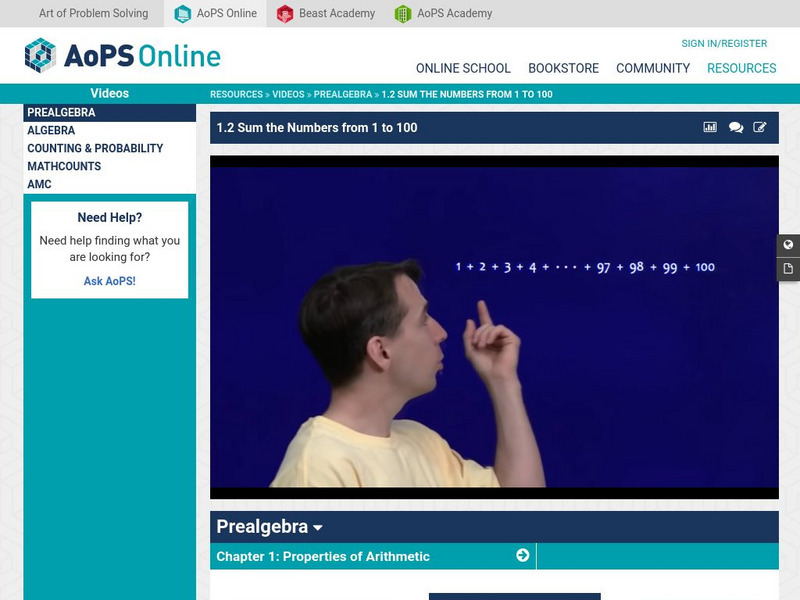Curated OER
How Do You Find the Nth Term in an Arithmetic Sequence?
To find the 20th term in an arithmetic sequence, use the secret formula. What secret formula? It's: a sub n equals a sub one plus parentheses n minus one close parentheses times d. Got that? No? The watch this video to learn about the...
Curated OER
How Do You Find the Next Terms in an Arithmetic Sequence?
Common difference? Sounds like an oxymoron. It's a math term used to describe a pattern that may occur between a series of numbers. Watch this video and the instructor will explain what the term means as it is applied to an arithmetic...
Curated OER
How Do You Determine if a Sequence is Arithmetic or Geometric?
Learners who view this video should gain a better understanding of the difference between a geometric sequence and an arithmetic sequence. The video includes an example of each, with step-by-step instructions on how to figure out which...
Curated OER
How Do You Find the Common Difference in a Sequence?
Briefly show your class or individual learners how to find the common difference in an arithmetic sequence. A quick and simple video, this resource should guide pupils toward understanding the concept of common difference. Appropriate...
Curated OER
How Do You Find the Common Difference in a Sequence?
Briefly show your class or individual learners how to find the common difference in an arithmetic sequence. A quick and simple video, this resource should guide pupils toward understanding the concept of common difference. Appropriate...
Khan Academy
Math Patterns Example 1, Applying Mathematical Reasoning, Pre-Algebra
Faced with a series of numbers, we need to find the following few values of the sequence. This short video shows an example of finding the following values in a sequence where we must find the pattern of adding a specific number each...
Curated OER
How Do You Determine if a Sequence is Arithmetic or Geometric?
Learners who view this video should gain a better understanding of the difference between a geometric sequence and an arithmetic sequence. The video includes an example of each, with step-by-step instructions on how to figure out which...
Curated OER
What's the Common Difference?
Plain and simple, the common difference is a constant value that is added to a term in an arithmetic sequence. For example in the arithmetic sequence - 10, 20, 30, 40 É. - the common difference would be 10.
Brightstorm
Introduction to Sequences
Finding patterns—seems easy enough. High schoolers learn the definition of a sequence in a concept video. Four problem videos then cover finding a particular term of a sequence given an explicit formula and identifying arithmetic...
Khan Academy
Recognizing Number Pattern Examples
This video looks again at finding the algebraic pattern in sequences. In the example, we are looking at a figure where several toothpicks (or lines) are added each time, and you need to find how many toothpicks will be in the 50th...
Khan Academy
Equations of Sequence Patterns, Sequences, Series and Induction, Precalculus
This video shows an example of writing an algebraic equation for the pattern of blocks that grows at each iteration. Sal shows how to find the pattern by looking at the number of iterations and blocks. He then continues this example by...
Sophia Learning
Sophia: Finding Unknown Values in Arithmetic Sequences
The mathematics resource includes an explanation of how to find missing values in an arithmetic sequence. The topic is explored through a video lesson with two examples.
Virtual Nerd
Virtual Nerd: How Do You Find the Common Difference in an Arithmetic Sequence?
Watch this tutorial and learn how to find the common difference in an arithmetic sequence. [1:25]
Virtual Nerd
Virtual Nerd: How Do You Find the Next Terms in an Arithmetic Sequence?
This video tutorial takes you through the process of finding the common difference which you can then use to find the next terms in an arithmetic sequence. [2:04]
Khan Academy
Khan Academy: Sequences and Series Review: Sequences and Series (Part 1)
An introductory video on sequences and series. Provides examples of both arithmetic and geometric series.
Khan Academy
Khan Academy: Pre Calculus: Sequences and Series (Part 1)
An introductory video on sequences and series. Provides examples of both arithmetic and geometric series, but does not give formal definitions. Introduces and uses sigma notation for sums of series. Illustrates how the general form for a...
Other
Is All About Math: Triangular Numbers (Part Ii)
Continuing the podcast from Triangular Numbers (Part I), the Gaussian formula for summing numbers of an arithmetic sequence is derived with good explanation, and then used for a couple examples.
Sophia Learning
Sophia: Common Difference
The common difference in an arithmetic sequence is explained using detailed examples. Learners watch the video tutorial to learn about the concept.
Khan Academy
Khan Academy: Statistics: Inductive Patterns
Video example showing two ways to write an expression to represent the number of toothpicks in the nth figure of a linear pattern and using the expression to determine the number of toothpicks in the 50th figure. [6:34]
Khan Academy
Khan Academy: Deductive and Inductive Reasoning: Inductive Patterns
Video example showing two ways to write an expression to represent the number of toothpicks in the nth figure of a linear pattern and using the expression to determine the number of toothpicks in the 50th figure.
Khan Academy
Khan Academy: Statistics: Inductive Reasoning 1
Video gives an example of using inductive reasoning to write an expression to represent the nth term of a linear pattern. [2:06]
Khan Academy
Khan Academy: Deductive and Inductive Reasoning: Inductive Reasoning 1
This video gives an example of using inductive reasoning to write an expression to represent the nth term of a linear pattern.
Art of Problem Solving
Art of Problem Solving: Sum the Numbers From 1 to 100
Video tutorial uses examples to reinforce understanding of how to find the sum of the numbers from 1 to 100. [2:48]






















